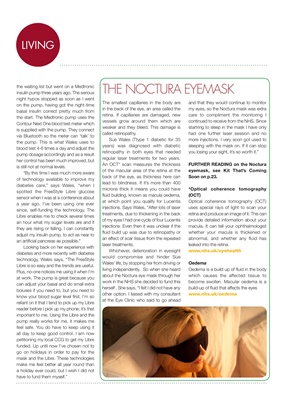
LIVINGLIVING
the waiting list but went on a Medtronic
insulin pump three years ago. The serious
night hypos stopped as soon as I went
on the pump, having got the night-time
basal insulin correct pretty much from
the start. The Medtronic pump uses the
Contour Next One blood test meter which
is supplied with the pump. They connect
via Bluetooth so the meter can 'talk' to
the pump. This is what Wales uses to
blood test 4-6 times a day and adjust the
pump dosage accordingly and as a result
her control has been much improved, but
is still not at normal levels.
"By this time I was much more aware
of technology available to improve my
diabetes care," says Wales, "when I
spotted the FreeStyle Libre glucose
sensor when I was at a conference about
a year ago. I've been using one ever
since, self-funding the technology. The
Libre enables me to check several times
an hour what my sugar levels are and if
they are rising or falling. I can constantly
adjust my insulin pump, to act as near to
an artificial pancreas as possible."
Looking back on her experience with
diabetes and more recently with diabetes
technology, Wales says, "The FreeStyle
Libre is so easy and the trends are useful.
Plus, no-one notices me using it when I'm
at work. The pump is great because you
can adjust your basal and do small extra
boluses if you need to, but you need to
know your blood sugar level first. I'm so
reliant on it that I tend to pick up my Libre
reader before I pick up my phone; it's that
important to me. Using the Libre and the
pump really works for me, it makes me
feel safe. You do have to keep using it
all day to keep good control. I am now
petitioning my local CCG to get my Libre
funded. Up until now I've chosen not to
go on holidays in order to pay for the
mask and the Libre. These technologies
make me feel better all year round than
a holiday ever could, but I wish I did not
have to fund them myself."
The smallest capillaries in the body are
in the back of the eye, an area called the
retina. If capillaries are damaged, new
vessels grow around them which are
weaker and they bleed. This damage is
called retinopathy.
Sue Wales (Ttype 1 diabetic for 35
years) was diagnosed with diabetic
retinopathy in both eyes that needed
regular laser treatments for two years.
An OCT* scan measures the thickness
of the macular area of the retina at the
back of the eye, as thickness here can
lead to blindness. If it's more than 400
microns thick it means you could have
fluid building, known as macula oedema,
at which point you qualify for Lucentis
injections. Says Wales, "After lots of laser
treatments, due to thickening in the back
of my eyes I had one cycle of four Lucentis
injections. Even then it was unclear if the
fluid build up was due to retinopathy or
an effect of scar tissue from the repeated
laser treatments.
Whichever, deterioration in eyesight
would compromise and hinder Sue
Wales' life, by stopping her from driving or
living independently. So when she heard
about the Noctura eye mask through her
work in the NHS she decided to fund this
herself . She says, "I felt I did not have any
other option. I liaised with my consultant
at the Eye Clinic who said to go ahead
and that they would continue to monitor
my eyes, so the Noctura mask was extra
care to compliment the monitoring I
continued to receive from the NHS. Since
startring to sleep in the mask I have only
had one further laser session and no
more injections. I very soon got used to
sleeping with the mask on. If it can stop
you losing your sight, it's so worth it."
FURTHER READING on the Noctura
eyemask, see Kit That's Coming
Soon on p.23.
*Optical coherence tomography
(OCT)
Optical coherence tomography (OCT)
uses special rays of light to scan your
retina and produce an image of it. This can
provide detailed information about your
macula. It can tell your ophthalmologist
whether your macula is thickened or
abnormal, and whether any fluid has
leaked into the retina.
www.nhs.uk/eyehealth
Oedema
Oedema is a build up of fluid in the body
which causes the affected tissue to
become swollen. Macular oedema is a
build-up of fluid that affects the eyes
www.nhs.uk/oedema
THE NOCTURA EYEMASK